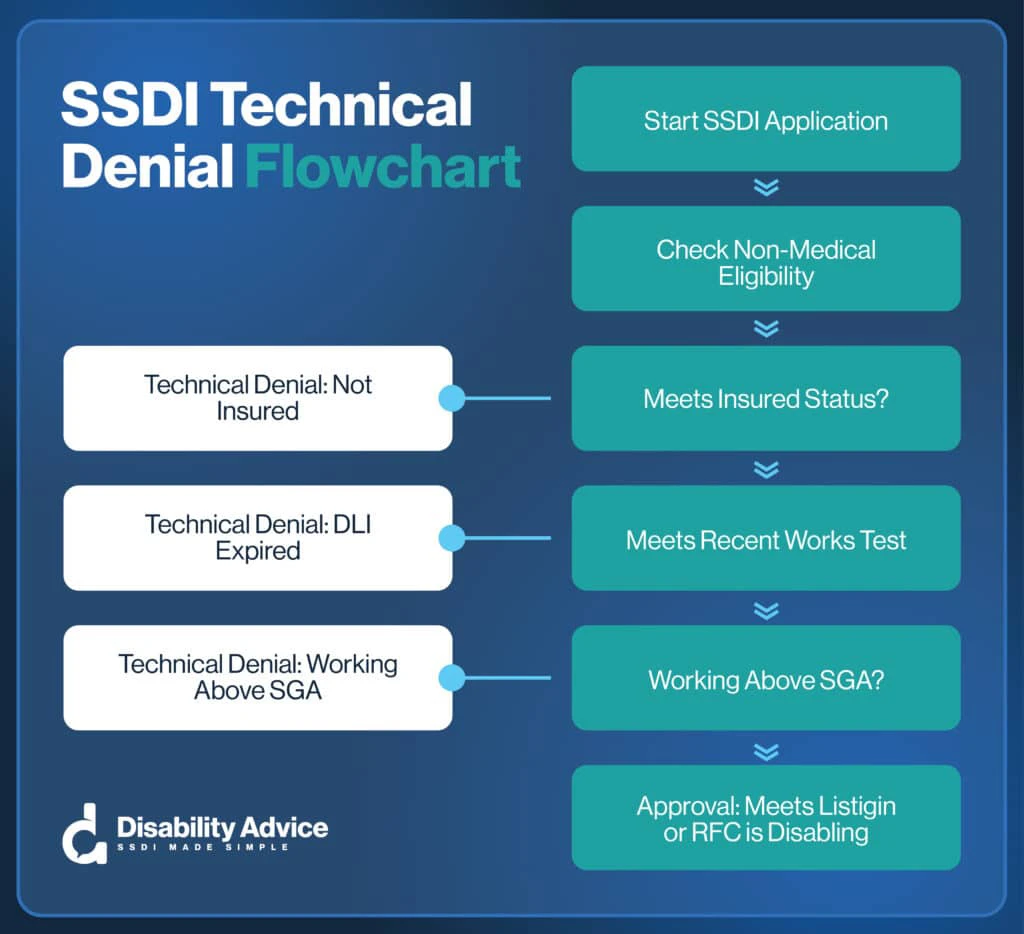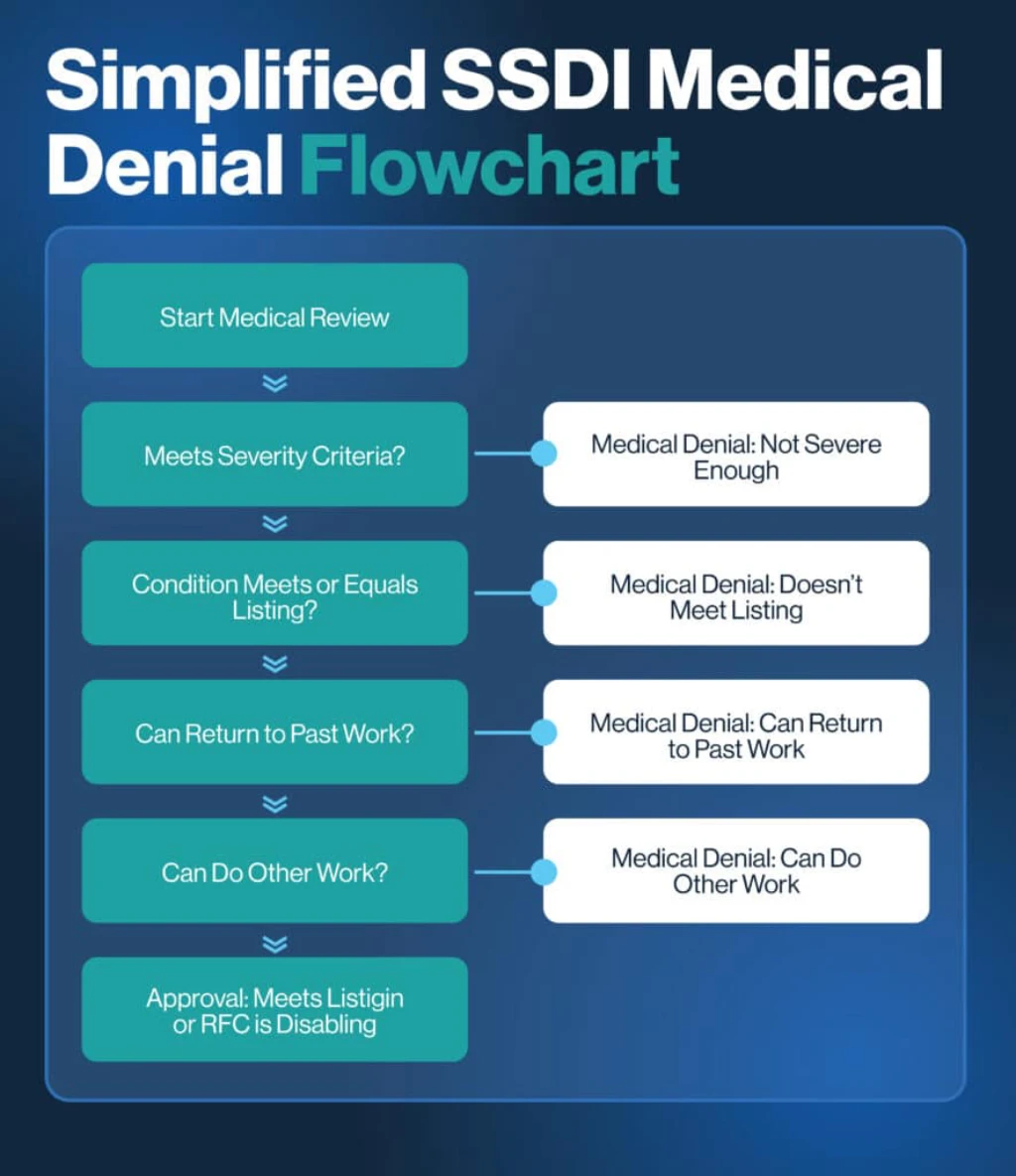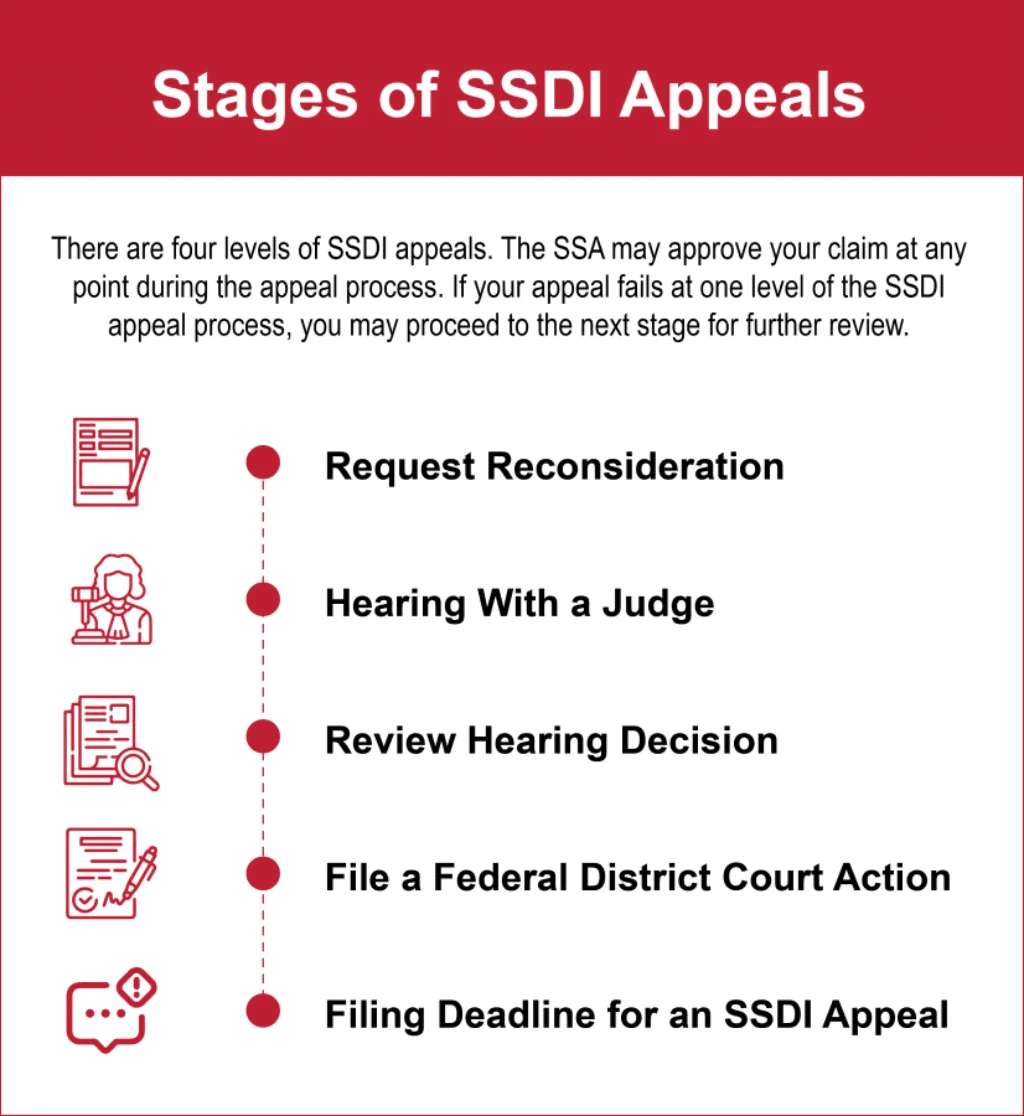SSDI Appeal
Social Security Disability Insurance, or SSDI, provides financial assistance to millions of Americans who cannot work due to a disability. However, providing the required documentation and proof of disability to the Social Security Administration is rarely easy. Inadequate documentation results in a high denial rate at the SSA. In fact, about 62 percent of fully insured applicants initially receive disability denials.
It can feel disheartening to receive a denial notice after working hard to present a strong SSDI claim, but a denial is not the end. If you believe the SSA has wrongly denied your claim for SSDI benefits, you can appeal the determination. By fully understanding your SSDI appeal options, you protect your ability to receive disability benefits.
Common Reasons Why SSDI Claims Are Denied
The SSA denies SSDI claims for two main reasons: technical denials and medical denials.
Technical Denials
A technical denial by the Social Security Administration (SSA) for a Social Security Disability Insurance (SSDI) claim means that the claim is denied without reviewing the claimant’s medical evidence. Instead, it is denied because the applicant does not meet one or more non-medical eligibility requirements.
Common Reasons for Technical Denials in SSDI:
- Not “Insured” for Disability Benefits. SSDI is like an insurance program—you must have worked and paid enough into the system through FICA taxes. Generally-speaking, you need 40 work credits total, with 20 earned in the last 10 years (for most adults aged 31+). Fewer credits are needed if you’re under 31. If you don’t meet this, you will be denied for lack of insured status.
- Insufficient Recent Work (Not Meeting the “Recent Work Test”). Even if you have 40 credits, if too many years have passed since you last worked, your Date Last Insured (DLI) may have expired. If you became disabled after your DLI, you’re not eligible.
- Current Substantial Gainful Activity (SGA). If you’re working and earning over the monthly SGA limit ($1,690/month in 2026 for non-blind individuals), SSA will issue a technical denial because you’re not considered disabled by their definition.
- Duplicate Application. Filing a second claim while one is still pending, or filing a claim that repeats a previous denied claim without change, can result in a technical rejection.
- Failure to Cooperate. Not returning required forms, missing consultative exams, or failing to provide basic information may lead SSA to deny the claim at the intake level.
- Non-Citizen or Immigration Status. You must be a U.S. citizen or meet specific lawful residency criteria to qualify. Certain visa holders, undocumented immigrants, or others with non-qualifying statuses can receive a technical denial.
What Happens After a Technical Denial?
In the event of a technical denial, the claim never goes to DDS for a medical review. You have the right to appeal (within 60 days), but the appeal must address the specific technical issue (e.g., proving insured status or stopping work). Often, a reapplication with corrected information is faster and more appropriate, depending on the denial reason.

Medical Denials
Medical denials concern whether your medical condition meets the SSA’s definition of a disability. To be considered disabled under Social Security regulations, you must have a severe medical impairment that lasts for at least 12 months or is expected to result in death. Your condition also must prevent you from engaging in substantial gainful activity, meaning you cannot work enough to earn more than a threshold amount. As of 2026, you cannot earn more than $2,830 monthly due to blindness and $1,690 monthly for any other type of disability.
Basically, a medical denial for Social Security Disability Insurance (SSDI) means the Social Security Administration (SSA) reviewed your medical evidence—unlike a technical denial—but decided that you do not meet their definition of disability.
SSA’s Definition of Disability
You must have a medically determinable physical or mental impairment that has lasted or is expected to last at least 12 months (or result in death) and prevents you from performing substantial gainful activity (SGA).
Common Reasons for SSDI Medical Denials Include:
- Impairments Are Not Severe Enough. SSA agrees you have a condition but believes it does not significantly limit your ability to work.
- Condition Doesn’t Meet or Equal a Listing. SSA uses a set of medical criteria called the Listing of Impairments. If your condition doesn’t meet or equal a listing and you can still perform work, you may be denied.
- You Can Still Perform Past Work. Based on your Residual Functional Capacity (RFC), SSA believes you can return to a job you’ve held in the past 5 years.
- You Can Perform Other Work. Even if you can’t do past work, SSA may say you can do other work based on your age, education, and skills.
- Inadequate Medical Evidence. If there’s not enough documentation to prove how severe your condition is (e.g., few doctor visits, no testing, no treatment history), SSA may deny your claim.
- Noncompliance with Treatment. If you don’t follow prescribed treatment without a valid reason, SSA may conclude you’re not taking reasonable steps to improve.
- Substance Abuse Is a Contributing Factor. If drug or alcohol use is a material factor in your disability, SSA will deny the claim unless the remaining impairments are still disabling.
What Happens After a Medical Denial?
- You can appeal the initial denial determination within 60 days.
- Reconsideration → Hearing by an ALJ → Appeals Council → Federal court
Many claims are initially denied and later approved on appeal, especially at the hearing stage when attorneys have an opportunity to cross-examine the vocational or medical experts.

Odds of Winning an SSDI Appeal
While the majority of first-time applications are denied, the odds of winning an SSDI appeal are in your favor. About fifty-three percent of SSDI applicants who meet technical requirements ultimately receive approval for benefits after the final appeal process.
It is in your best interest to appeal a denial if you believe you meet the SSDI criteria. The effort of appealing pays off for most applicants, and doing so is often quite manageable with a Social Security Disability appeal lawyer’s help.
Although most first-time SSDI applicants are denied, the odds improve significantly if you pursue an appeal. In fact, approximately 53% of applicants who meet the technical eligibility requirements are ultimately approved for benefits by the end of the appeals process.
If you believe you qualify for SSDI, it is strongly in your best interest to appeal. Many applicants find that the effort is well worth it—especially with the guidance of an experienced Social Security Disability appeal attorney, who can help make the process more manageable and increase your chances of success.
SSDI Appeals Process
You must begin the SSDI appeals process by sending a written request to the SSA within 60 days of the denial notice. The most convenient way to submit an appeal request is online through the SSA’s website. You also can complete an appeal form and submit it by mail.
Stages of SSDI Appeals
There are four levels of SSDI appeals. The SSA may approve your claim at any point during the appeal process. If your appeal fails at one level of the SSDI appeal process, you may proceed to the next stage for further review.
Request for Reconsideration
During a reconsideration, a disability examiner and a state agency medical consultant who were not part of the team that issued the initial denial determination will review your claim. They will look at all the evidence you originally submitted and any additional evidence you have provided with your appeal.
Hearing With an Administrative Law Judge
If you disagree with the SSA’s decision after a reconsideration request, you may request a hearing with an Administrative Law Judge (ALJ). The hearing will occur at one of the SSA’s hearing offices. During the scheduled hearing, you will have the opportunity to present your case to the ALJ and provide testimony.
Request for Review of Hearing Decision
If you don’t agree with the ALJ’s decision, you may request a review with the Social Security’s Appeals Council. The Appeals Council may return your case to the hearing level for further review from an Administrative Law Judge. It also may issue a new decision without another hearing.
File a Federal District Court Action
If the Appeals Council’s decision is not in your favor, you can take your appeal even further by filing a civil lawsuit in U.S. District Court. A federal judge in your local judicial district will review your administrative record and decide if there were errors in the prior appeal levels.
Filing Deadline for an SSDI Appeal
The SSA requires you to request an appeal within 60 days of receiving a decision. This deadline applies at all levels of the appeals process.
For example, if you’re appealing a denial of your initial application, you’ll have 60 days from the date you received your denial letter. If your case makes it to the Appeals Council and you disagree with their decision, you’ll have 60 days from their decision date to request a district court review.

How Long Does an SSDI Appeal Take?
The average SSDI appeal takes approximately 15 months. However, the timeline varies depending on each case’s unique circumstances. A case that resolves at the reconsideration level will take less time than one that goes through all four levels of appeal. Furthermore, the more evidence that the SSA needs to review, the more time it will take to receive a decision.
The estimated time at each level is dependent on the SSA and DDS workloads, the number of available trained disability examiners and physicians. Here’s a breakdown of the estimated time each level of appeal took last year:
- Reconsideration: One to six months
- Hearing by an administrative law judge: 10 to 16 months for a hearing decision
- Appeals Council review: One to three months to receive a decision after your hearing
- Federal district court action: Depends on the federal court’s schedule, but may take one to two years for a decision
What To Expect After Winning an SSDI Appeal
If your appeal is successful, you may begin receiving benefits within just a few weeks. However, a waiting period may apply if your appeal is resolved quickly. The SSA requires SSDI applicants to wait five months before receiving their disability payments, unless the condition is Amyotrophic Lateral Sclerosis (ALS). This waiting period begins on the established onset date of your disability.
Additionally, you can expect to receive back pay for the months that your disability prevented you from working. The maximum amount of back pay you can receive is 12 months from the date of your initial application. Thus, you may receive back pay for the period between your application date and the date the SSA approves your benefits.
You’ll automatically start receiving Medicare benefits 24 months after your disability benefits begin. An exception applies if you have amyotrophic lateral sclerosis, or Lou Gehrig’s disease. In that case, you’ll start receiving Medicare as soon as you begin receiving SSDI benefits.
How To Strengthen Your SSDI Appeal
There’s no guarantee of a favorable SSDI appeal, but certain measures can improve your chances of winning:
- Timely file your appeal. If you miss the 60-day deadline, you will lose your right to appeal, unless your attorney has established good cause for the late filing. You will then need to start a new case from scratch and restart the application process.
- Take some time to understand your denial. Carefully review the reasons for your denial and address each issue in your appeal.
- Submit all supporting medical and non-medical evidence. If there’s the slightest chance that a piece of evidence could be relevant, include it in your appeal.
- File the proper paperwork. Make sure you fill out the necessary forms correctly and completely.
- Hire a lawyer. The right attorney can improve your chances of successfully appealing your SSDI decision.
Hiring an Experienced Lawyer To Increase Your Chance of Winning an Appeal
You’re handling enough while your disability keeps you out of work. Consider hiring an experienced SSDI lawyer to help with your appeal. A Social Security Disability appeal lawyer can help you understand your denial and develop a comprehensive plan for the appeal. They’ll gather strong evidence on your behalf, guide you through the SSDI appeal process, and represent you at any hearings.
Disability Advice can connect you with an experienced lawyer who can enhance your chances of getting approved. Contact us today for a free consultation.
“The person I spoke with was very knowledgeable and very thorough with answering all of my questions and making sure all my information was correct. He was very patient, kind, and was very helpful. I wasn’t sure if I would qualify, and he checked and took all of my information. The process was made very easy, thank you so much for your help.”
“I was very nervous about reaching out for help with disability benefits. This experience was so much easier than what I thought it would be. They were understanding and supportive, and answered all of my questions. I would highly recommend them.”
“I had a great experience with my representative. She was very friendly and she made the process very easy. I’m glad I had the pleasure to work with her in filing my claim. She provided great customer service.”
“Professionalism at its best. From intake to getting my claim started, they are the ones you need. 100% recommend to everyone.”
“Having never gone through this process before, it was very easy and straightforward. VERY professional and polite.”
“One of the best customer service experiences I have ever had. Patient and kind and couldn’t of made my experience better. Thank you for all the help.”

